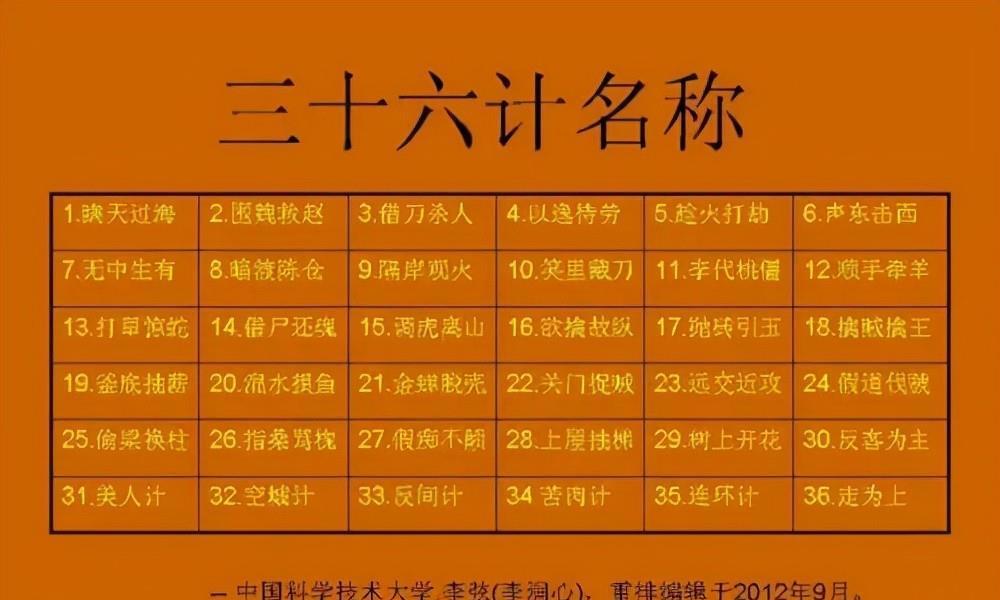Thirty-six practical applications (6)
Six six thirty-six, the number in the technique, the number in the operation. "Soldiers are not tired of deception" is a prominent feature of military struggle, and China has always paid great attention to the strategy of military struggle, and since ancient times there have been various books on the art of war. Among them, the "Thirty-Six Plans" was written in the Ming and Qing dynasties, which belongs to the later one, so it is a collection of dacheng ones. The "Thirty-Six Plans" summarizes the military thinking and struggle experience of successive dynasties, and in this issue we will understand the last plan in the winning battle plan, "sound east and attack west".

"The enemy is confused, not afraid, kun under the image of the upper, and take advantage of it involuntarily." The "kun" in the gossip refers to "ground", "exchange" refers to "water", and "kun under the upper" means stagnant water that rises above the ground, which sooner or later will break the embankment. It is important to understand that "KunXia And Shang" symbolizes a ragtag crowd that is not properly commanded. In other words, the primary premise of "attacking the west with sound from the east" is the enemy's situation, and the enemy's stupidity and improper command are the basis for the success of the "sound east attack west" strategy. However, when encountering a wise opponent, the strategy is also easy to see.
In the novel "Romance of the Three Kingdoms", there is a chapter "Jia Wen and the Enemy Decisive Victory" that has a wonderful description of this situation: Cao Cao attacked Zhang Xiu, circled the city for three days, and found that the color of the bricks and soil in the southeast corner of the city was old and new, as if it had been newly built, it was relatively weak, and decided to break the city from then on. Therefore, Cao Mengde, who was good at "deception", deliberately accumulated grain and grass in the northwest corner and pretended to be a siege to mobilize Zhang Xiu's troops. This plan was recognized by Zhang Xiu's strategist Jia Xue, who specially transferred the garrison in the northwest corner to the southeast corner of the city as an ambush, and later Cao Cao did indeed attack the city in the southeast corner, because Zhang Xiu's army had long been prepared, Cao Cao was finally defeated by the ambush. This is the novelist's statement, but in history, when there was indeed a rebellion in the Seven Kingdoms of the Han Jing Emperor, Zhou Yafu saw through the siege plan of Wu Wangsheng's attack on the west and thwarted the attack of Wu Wang, which is the same as the description of the "Romance of the Three Kingdoms". Because this strategy is often used and often recognized, there are many cases of yin and yang, and there are many ironic cases, such as the situation when Napoleon went to Egypt.
In May 1798, Napoleon went on an expedition to Egypt. Fearing that the French fleet would be intercepted by the British fleet in the Mediterranean, Napoleon first used various means to spread false information, saying that the French Mediterranean Fleet would enter the Atlantic Ocean and land in Ireland. This news made the British naval commander Nelson believe that he had hurriedly mobilized his fleet in the Strait of Gibraltar to intercept the French fleet passing through the strait, and Napoleon took the opportunity to depart from the port of Toulon for Egypt. However, Nelson was not a dimwitted commander, and immediately found out the plan, and immediately set sail to catch up, not wanting to run to the front of the French fleet. When Nelson arrived in Alexandria, Egypt, not a single French warship was found, and Nelson, who was suspicious, estimated that Napoleon's target might be Constantinople further east, and pounced there again. As soon as the Front Foot of the British Warship left, the French Warship rushed to Alexandria on the back foot and landed smoothly, thus entering and occupying Egypt. This operation was really a bit of an opportunity and coincidence, and Napoleon's "sound east attack west" strategy was successful.
The ancients believed that in order to successfully use this strategy, it is necessary to find out whether the enemy understands our feelings, whether there is a "sign of kun under the upper" and flexibly adopt it, and cannot be rigidly applied. However, due to the asymmetry of information, the development of the situation on the battlefield can sometimes be unexpected and ridiculous, such as the success of Napoleon's expedition to Egypt, which is indeed a bit of luck.